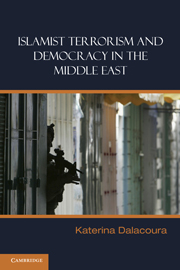Book contents
- Frontmatter
- Contents
- Acknowledgements
- Introduction: The Book's Central Question and Rationale
- 1 Terrorism, Democracy and Islamist Terrorism
- 2 Transnational Islamist Terrorism: Al Qaeda
- 3 Islamist Terrorism and National Liberation: Hamas and Hizbullah
- 4 Islamist Terrorism in Domestic Conflicts: The Armed Islamic Group in Algeria and the Gamaa Islamiya in Egypt
- 5 Moderation and Islamist Movements in Opposition: The Jordanian Muslim Brotherhood/Islamic Action Front, the Egyptian Muslim Brotherhood and the Tunisian Nahda
- 6 Islamist Moderation and the Experience of Government: Turkey's Welfare and Justice and Development Parties and the Islamic Republic of Iran
- Conclusion
- Bibliography
- Index
Introduction: The Book's Central Question and Rationale
Published online by Cambridge University Press: 05 June 2012
- Frontmatter
- Contents
- Acknowledgements
- Introduction: The Book's Central Question and Rationale
- 1 Terrorism, Democracy and Islamist Terrorism
- 2 Transnational Islamist Terrorism: Al Qaeda
- 3 Islamist Terrorism and National Liberation: Hamas and Hizbullah
- 4 Islamist Terrorism in Domestic Conflicts: The Armed Islamic Group in Algeria and the Gamaa Islamiya in Egypt
- 5 Moderation and Islamist Movements in Opposition: The Jordanian Muslim Brotherhood/Islamic Action Front, the Egyptian Muslim Brotherhood and the Tunisian Nahda
- 6 Islamist Moderation and the Experience of Government: Turkey's Welfare and Justice and Development Parties and the Islamic Republic of Iran
- Conclusion
- Bibliography
- Index
Summary
The attacks against the United States of 11 September 2001 stunned the world and left a shocked American public wondering ‘why do they hate us?’ In the debate that followed in US public policy and academic fora, a consensus quickly formed that the terrorism of al Qaeda – and Islamist terrorism more generally – was the product of a democratic deficit in the Middle East. Not everyone agreed that this was the only cause; many argued that Islam itself, poverty and social anomie, or resentment towards US policies in the Middle East were also possible answers. However, there were few detractors of the proposition that brutal authoritarianism in the Middle East was a key reason behind the renewed threat of Islamist terrorism now confronting the world.
The causal links appeared self-evident. Being excluded from political processes deprived Islamists of the opportunity to peacefully express their views and pursue their political objectives. It prevented them from becoming socialised in the norms of negotiation and compromise, the ordinary give-and-take of politics. Isolation forced some of these individuals and groups to take up arms. Repression, in the form of imprisonment, torture and persecution of themselves and their loved ones, exacerbated feelings of alienation from their respective societies and governments and sowed hatred in their hearts. Regimes encouraged virulent anti-American rhetoric in place of dissent and exported troublemakers to assure internal stability.
- Type
- Chapter
- Information
- Islamist Terrorism and Democracy in the Middle East , pp. 1 - 20Publisher: Cambridge University PressPrint publication year: 2011



